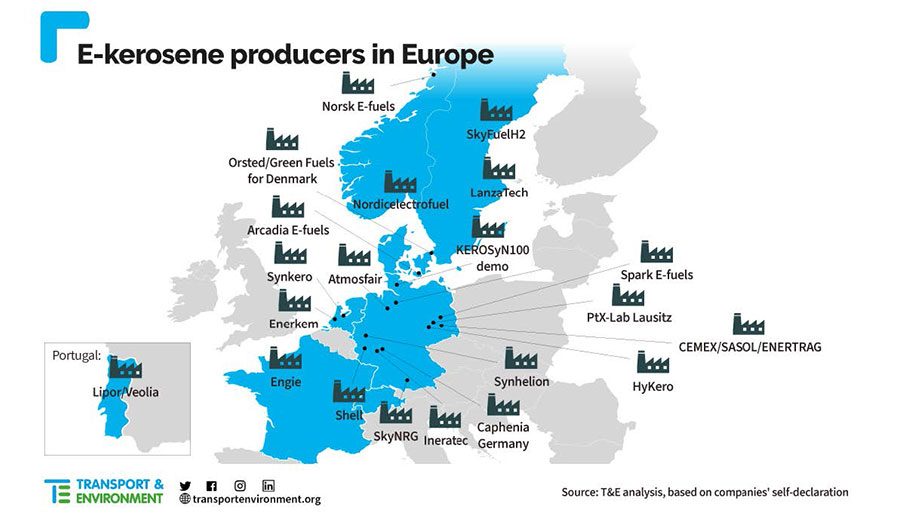
Sustainable fuel manufacturers in Europe could produce 1.83 million tonnes of e-kerosene in 2030, saving about 5 Mt of CO2, according to a new forecast by NGO Transport and Environment (T&E).
E-kerosene, generated by combining green hydrogen (H2) and carbon dioxide (CO₂), has the potential to substantially reduce the climate impact of aviation. In its new forecast, T&E analyzed the planned production capacity of 18 European e-kerosene manufacturers. It found that by 2025, over 0.16 Mt of e-kerosene would be available for airlines every year. By 2030, this figure will reach over 1.83 million tonnes which would 3.65 per cent of fuel demand in Europe and would save the equivalent of up to 5 Mega tonnes of CO22 – the emissions equivalent to 30,000 transatlantic flights.
T&E’s new analysis shows that the European e-kerosene market is ready for higher rates and faster scaling of this fuel, but that policy makers are not providing sufficient incentives to develop the production further. In order to decarbonize aviation fast and efficiently, e-kerosene needs to be made readily available for airlines to blend into their existing jet fuels.
Two conditions are essential for e-kerosene to have near zero greenhouse gas emissions and to be produced at scale. First, hydrogen needs to be produced using additional renewable electricity (so-called “green hydrogen”). Second, carbon dioxide needs to be captured from the atmosphere, a process otherwise known as direct air capture (DAC). T&E’s new analysis shows that seven out of 22 manufacturers plan to include DAC as a source of CO2.

In July 2021, the European Commission proposed new legislation called ReFuelEU, to increase the share of sustainable aviation fuels (SAF) in Europe. The Commission has proposed SAF-blending mandates combined with an e-kerosene fuel subtarget. Since the original proposal landed, ReFuelEU has faced heavy scrutiny. A number of EU member states have been reluctant to keep the climate ambition of the text, going as far as including unsustainable biofuel feedstocks.
The targets for e-kerosene proposed by the European Commission in its ReFuelEU proposal are too low and start too late (no mandate in 2025 and only 0.7 per cent in 2030). T&E’s new analysis shows that targets for e-kerosene proposed by the European Commission in its ReFuelEU proposal are too low and start too late (no mandate in 2025 and only 0.7 per cent in 2030).
T&E’s new analysis shows that an earlier and more ambitious e-kerosene mandate of at least 0.1 per cent in 2025 and 2.0 per cent in 2030 is possible. This should come in lieu of biofuels derived from unsustainable feedstocks.
Matteo Mirolo, aviation policy officer at T&E, said, “Europe has a once in a lifetime opportunity to become the leader for green aviation through its ReFuelEU proposal. For that, policymakers have to prioritise the right type of sustainable fuels: rather than biofuels derived from unsustainable feedstocks, the EU needs to raise the game on e-kerosene.
The analysis is available to download from Transport and Environment’s website












